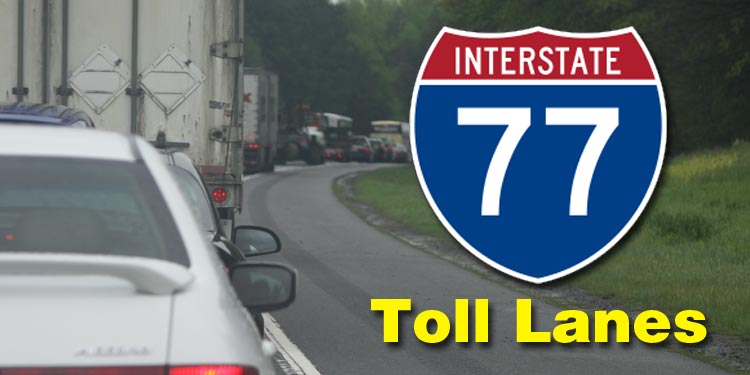OPINION. The fight against the managed lane project on I-77 got a subtle boost when the schedule of the I-77 Advisory Group meetings was not just enlarged, but it was changed to accommodate NCDOT Secretary James Trogdon’s schedule.
An NCDOT spokeswoman said the governor’s highways boss wants to attend the I-77 meetings and hear feedback from influential members.
Members include Mecklenburg County Commissioners Pat Cotham and Jim Puckett; Cornelius Commissioner Kurt Naas, the founder of the original anti-toll group WidenI-77; and former Lake Norman Chamber Chair Mike Russell.
“It bodes well for the work that the I-77 advisory board has done to date. It bodes well that he finds this a very informed respectful group that is representing the facts so well for our community,” said Cornelius Mayor Woody Washam.
“I believe some improvement to the contract has the potential to occur,” he added. 
Completing the project and and deleting the contract—aka Complete and Delete—is one of the options the group is looking at. It would add the most general purpose lanes, but it would mean starting up an environmental review.
Naas said the I77 managed lane project is an exceptional situation which calls for exceptional treatment.
He outlined a plan for the legislature to step in and allocate the necessary funding and at the same time eliminate the profoundly odd Charlotte Regional Transportation Planning Organization which gives Charlotte 46 percent of the vote.
“We would still have to obtain the environmental approvals, but that process can start now,” Naas said.
Bottom line, the project could be completed and deleted by the end of 2019, Naas said.
More and more people agree waiting 50 years for the $640 million contract with Cintra to expire would be an economic development disaster.
Transportation economist David Hartgen, a retired UNC-Charlotte professor, said the direct economic impact over the life of the contract will approach $34 billion.
In other words, the tolls—which NCDOT says will not reduce congestion on I-77—will pull about 6 percent out of the corridor’s gross domestic product.
Major highway projects routinely provide a positive economic impact, he says.
For those who use the tolls, the benefit over five decades is $600 million, Hartgen explains. “Even though they are paying the tolls, they are getting benefits…in order to make this work, their value of time has to be quite high,” he says.
Hence the name Lexus Lanes.
It’s also why the toll lanes, which are priced around congestion and volume, amount to “a huge subsidy by non-users to users of the tolls—because of their lost time,” Hartgen says.
A picture of congestion—and business moving away—becomes more clear when trucks are factored in.
Trucks move nearly three-quarters of the nation’s freight. But the 900-page Cintra contract stipulates that the new toll lanes would not be built to carry semi-tractors hauling freight.
It means the enormous semis would travel in the general purpose lanes. It also means manufacturers and distributors will think twice about locating up and down the I-77 corridor.
“My assessment is there will be a great deal of economic harm to the corridor—$30- to $34 billion in real dollars,” Hartgen says.
More than $12 billion in economic benefit goes to Cintra, the American arm of a Spanish company, and on to Spain.
There was never an economic impact study done for the toll plan.
Hartgen says the environmental review “didn’t look at anything other than a toll option” yet the contract prohibits widening without a congestion management plan.
“It’s really remarkable actually,” he said, explaining that managed lanes—as opposed to toll lanes—are “just another one of the experiments in transportation planning that took over the transportation planning profession, beginning in the 1990s.”
This contract is so bizarre it defies explanation, according to N.C. Rep. Chaz Beasley—as if it was written by Cintra. Mecklenburg County Commissioner Jim Puckett calls it a “pig of a contract.”
It’s time for the state to own up to the mistake and cancel it. If environmental reviews will make us wait till 2019, it’s far better than dealing with an economic disaster for 50 years.
—Dave Yochum

Discussion
No comments yet.